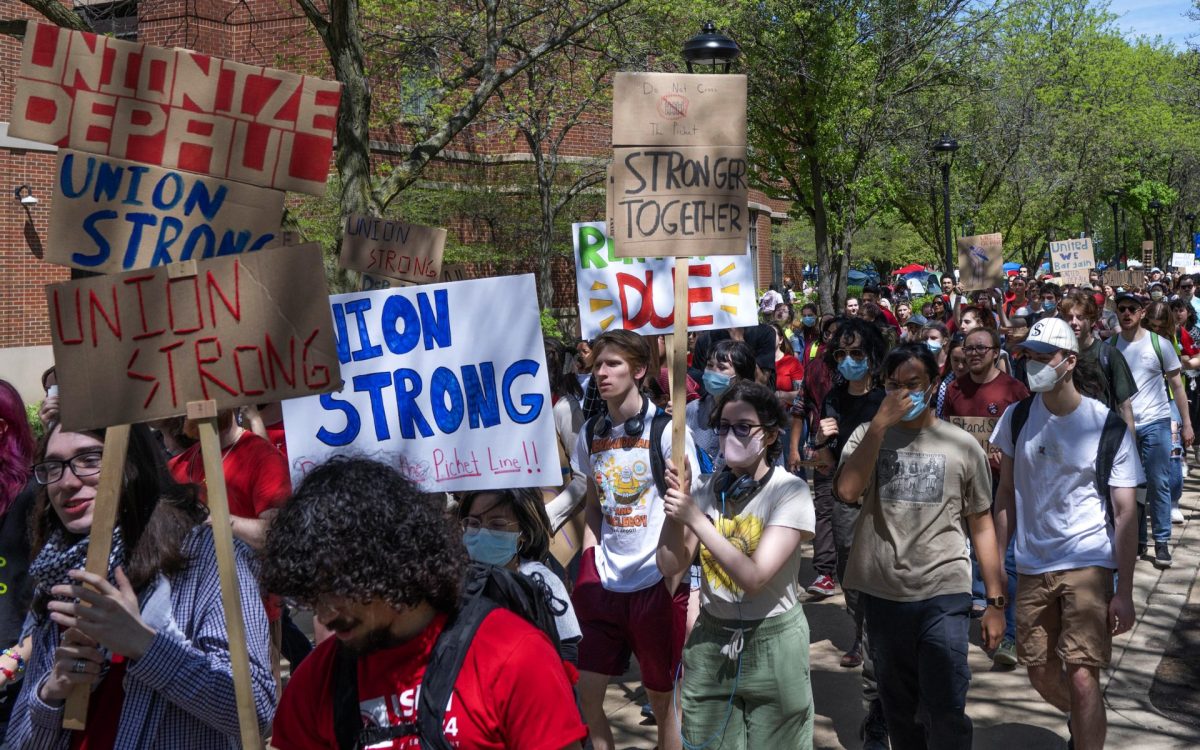During a time of continued financial difficulty in the world of higher education, DePaul announced its 2014- 2015 budget, which not only continued but also reinforced the cuts and budgeting strategies that were put in place last year with several new actions.
In a letter from President Rev. Dennis H. Holtschneider, C.M. to the faculty of the university, new initiatives were announced, designed to cut costs and save money over the next year. Among the announcements in the letter were new science labs, a halt on annual pay increases for 2015, and a new incentivized retirement program for staff and faculty.
“(Strategic Resource Allocation Committee’s) work was understandably difficult, given the changes in enrollment that I first shared with you at September’s Convocation,” Holtschneider wrote.
DePaul is a tuition-dependent school and in recent years has seen a down turn in new students. This year enrollment decreased by 1.7 percent or 423 students across the university.
The budget that Holtschneider approved was proposed by (SRAC), which is made up of student, staff, faculty and administrative representatives who have been working on the budget since early in October.
In the letter, Holtschneider laid out six actions the university will take in order to meet the goals set by SRAC. While maintaining some of the same policies set last year, like requiring cabinet-level approval for any new hires from outside the university, most of the actions the school will be taking are new.
Despite announcing that the university will begin to slow the aggressive pace of capital improvements, Holtschneider wrote that investment would continue to be made in programs with the potential to attract new and capable students to DePaul. One such example is the new health program whose recent success has persuaded the school to invest in constructing new science labs.
Last year, faculty were told that their annual pay increase would be delayed. In the letter, Holtschneider announced not only that the 2014 salary increase be paid out in a lump sum this month for any full time employee making more than $50,000 a year, but that there would be no increase in 2015.
The annual bonus raise has been 2 percent of the faculty and staff’s salary in the past. By stopping the raises the university is saving around $7 million, according to Kevin Stevens the Director of and professor at the School of Accountancy and Management Information Systems and a faculty representative to the SRAC.
“We are a very lean organization,” Stevens said. “The cuts were designed to keep people working. We would rather forgo a raise than lay people off.” Stevens continued on to say that stopping the annual raise was a Vincentian action.
The university will also be making a push to get the average course load for faculty up to a minimum of six classes per year. While this has been a stated goal of the university for some time, in recent years the average tenured and tenuretrack professor has been just below five courses per year.
Stevens believes part of the reason for the slip in the average is the hiring of more tenure track professors as of late. Faculty members who are not tenuretrack will teach about 9 classes a year on average; however, they do not have the research and publication requirements of those who are tenure track. According to Stevens, the Board of Trustees is the driving force behind raising the average course load.
Another new action by the university will be to create incentivized retirement programs in selected colleges. Holtschneider discussed that the retirement program may grow to include most of the university’s colleges.
“This is a cost saving measure,” Stevens said. “By offering a buyout option to faculty who may have been considering retirement, we can save money on the cost of their future salary.”
“I believe the DePaul community recognizes the challenging economic times we are in and the need to carefully control expenditures and the cost of education,” Bob Kozoman, DePaul’s executive vice president said. “Faculty and staff alike are working to reduce costs, thereby keeping expenses down as much as possible for our students.”
Just last year, the school instructed each college to use as little of their discretionary funds as possible. The discretionary funds for each college are set aside for costs such as replacing a faculty members broken laptop or other miscellaneous issues that arise. While this was successful over the past year, Stevens says that the new initiatives by the university were essential because there was only so much money to be saved in the discretionary budgets.
“The recession finally hit us,” Stevens said. DePaul was able to make it through the recession without feeling the effects too much because of its low reliance on the earnings from the university’s endowment. According to Stevens, most large, private universities rely on using 40 to 50 percent of their endowments’ earnings each year, while DePaul has traditionally only used 2 percent of their endowments earnings.
DePaul’s fiscal planning and responsibility has not gone unnoticed.
“Both Moody’s and Standard & Poor’s took notice and complimented DePaul for our responsible fiscal management last year, in a time when they were largely downgrading higher education across the nation,” Father Holtschneider wrote.
In fact, Standard & Poor upgraded DePaul’s rating from an A- ranking to an A last year. According to Stevens, the increase in credit ranking is important because it will lower the interest rate that the university will have to pay and save the university money in the long run.
“It was a difficult budget to assemble,” Kozoman said. “A strong spirit of collegiality was very evident in all the work of the committee as it deliberated ways to keep costs down as much as possible.”
“What touches my heart most, however, was the real concern that our colleagues on SRAC showed to find ways to be true to our budget while keeping as many of our colleagues employed as possible,” Holtschneider wrote. “This was selfless and DePaul at its best.”
“As part of vision 2012 the university hired many more advisors for students across the university and we weren’t willing to undo that,” Stevens said. “Once we came to that conclusion it just became a budgeting issue.”







